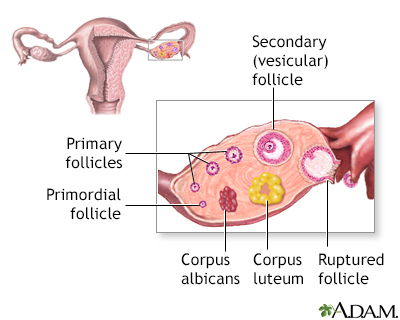Polycystic Ovary Syndrome

What is Polycystic Ovary Syndrome?
Polycystic ovary syndrome (PCOS) is a common hormonal disorder that affects women of reproductive age. It is characterized by irregular periods, high levels of androgens (male hormones), and the presence of multiple small cysts on the ovaries.
Who's at risk for PCOS?
Risk factors for PCOS include a family history of the condition, obesity, insulin resistance, and type 2 diabetes. Women of all ethnicities can be affected by PCOS, but it is more common in certain populations, such as those of South Asian descent.
What causes PCOS?
The exact cause of PCOS is unknown, but it is thought to involve a combination of genetic and environmental factors. Insulin resistance, hormonal imbalances, and inflammation are all believed to play a role in the development of the condition.
How does PCOS start?
PCOS often begins during a woman's teenage years, but it can develop at any time during her reproductive years. The hormonal imbalances and insulin resistance associated with PCOS can lead to irregular periods, the development of ovarian cysts, and other symptoms.
What are the symptoms of PCOS?
Symptoms of PCOS may include irregular or missed periods, excessive hair growth (hirsutism), acne, weight gain, thinning hair on the scalp, and difficulty getting pregnant. Not all women with PCOS will have all of these symptoms, and the severity can vary widely.
How is PCOS diagnosed?
Diagnosing PCOS involves a combination of a medical history, physical examination, blood tests to measure hormone levels, and an ultrasound to evaluate the ovaries. There is no single test for PCOS, and a healthcare provider will typically rule out other potential causes of the symptoms before making a diagnosis.
How can PCOS be treated?
Treatment for PCOS may include lifestyle changes, such as a healthy diet and regular exercise, to help manage insulin resistance and weight. Medications, such as hormonal contraceptives, anti-androgen drugs, or insulin-sensitizing agents, may also be prescribed to help regulate hormones and manage symptoms. In some cases, fertility treatments may be necessary for women with PCOS who are trying to conceive.
What complications may occur with PCOS?
Complications associated with PCOS include an increased risk of type 2 diabetes, high blood pressure, high cholesterol, sleep apnea, depression, and endometrial cancer. Women with PCOS are also more likely to experience fertility issues and pregnancy complications.
How can I prevent PCOS?
While it may not be possible to prevent PCOS entirely, maintaining a healthy lifestyle with a balanced diet, regular exercise, and stress management can help reduce the risk of developing the condition and manage its symptoms.
Long-term management of PCOS
Long-term management of PCOS involves regular monitoring by a healthcare provider, appropriate treatment to manage symptoms, and adopting a healthy lifestyle to minimize the risk of complications.
What is recent research saying about PCOS?
Recent research has focused on understanding the genetic and molecular basis of PCOS, as well as exploring new treatment options, such as targeted therapies and alternative approaches, to manage symptoms more effectively.
Where can I go for more information on PCOS?
For more information on PCOS, consult your healthcare provider or visit reputable websites like the PCOS Awareness Association or the American Society for Reproductive Medicine.

